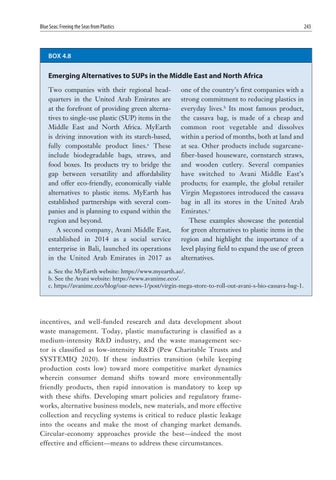Blue Seas: Freeing the Seas from Plastics
243
BOX 4.8
Emerging Alternatives to SUPs in the Middle East and North Africa Two companies with their regional headquarters in the United Arab Emirates are at the forefront of providing green alternatives to single-use plastic (SUP) items in the Middle East and North Africa. MyEarth is driving innovation with its starch-based, fully compostable product lines.a These include biodegradable bags, straws, and food boxes. Its products try to bridge the gap between versatility and affordability and offer eco-friendly, economically viable alternatives to plastic items. MyEarth has established partnerships with several companies and is planning to expand within the region and beyond. A second company, Avani Middle East, established in 2014 as a social service enterprise in Bali, launched its operations in the United Arab Emirates in 2017 as
one of the country’s first companies with a strong commitment to reducing plastics in everyday lives.b Its most famous product, the cassava bag, is made of a cheap and common root vegetable and dissolves within a period of months, both at land and at sea. Other products include sugarcanefiber-based houseware, cornstarch straws, and wooden cutlery. Several companies have switched to Avani Middle East’s products; for example, the global retailer Virgin Megastores introduced the cassava bag in all its stores in the United Arab Emirates.c These examples showcase the potential for green alternatives to plastic items in the region and highlight the importance of a level playing field to expand the use of green alternatives.
a. See the MyEarth website: https://www.myearth.ae/. b. See the Avani website: https://www.avanime.eco/. c. https://avanime.eco/blog/our-news-1/post/virgin-mega-store-to-roll-out-avani-s-bio-cassava-bag-1.
incentives, and well-funded research and data development about waste management. Today, plastic manufacturing is classified as a medium-intensity R&D industry, and the waste management sector is classified as low-intensity R&D (Pew Charitable Trusts and SYSTEMIQ 2020). If these industries transition (while keeping production costs low) toward more competitive market dynamics wherein consumer demand shifts toward more environmentally friendly products, then rapid innovation is mandatory to keep up with these shifts. Developing smart policies and regulatory frameworks, alternative business models, new materials, and more effective collection and recycling systems is critical to reduce plastic leakage into the oceans and make the most of changing market demands. Circular-economy approaches provide the best—indeed the most effective and efficient—means to address these circumstances.






